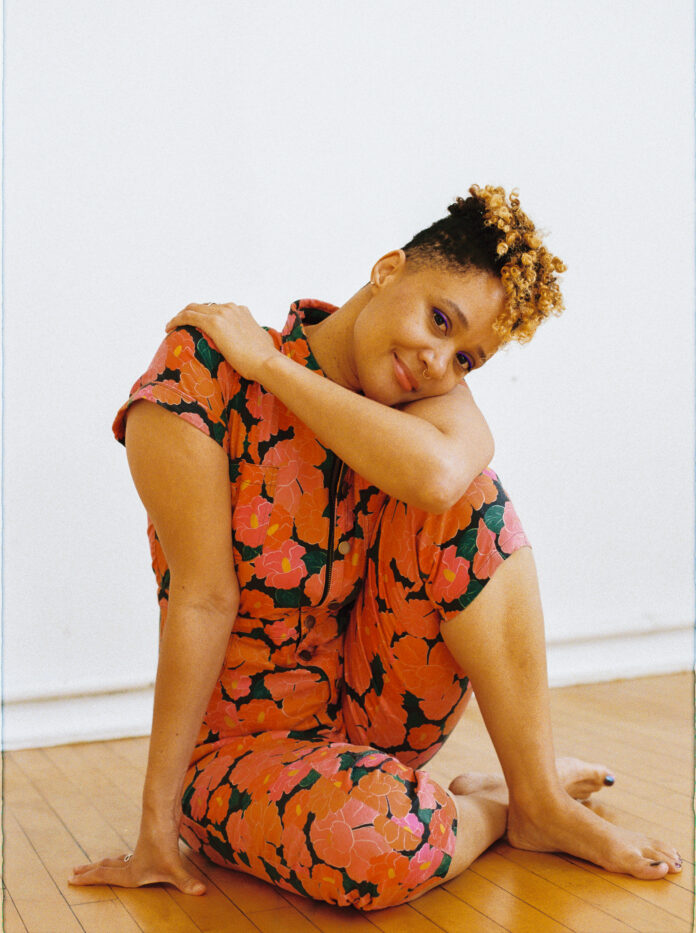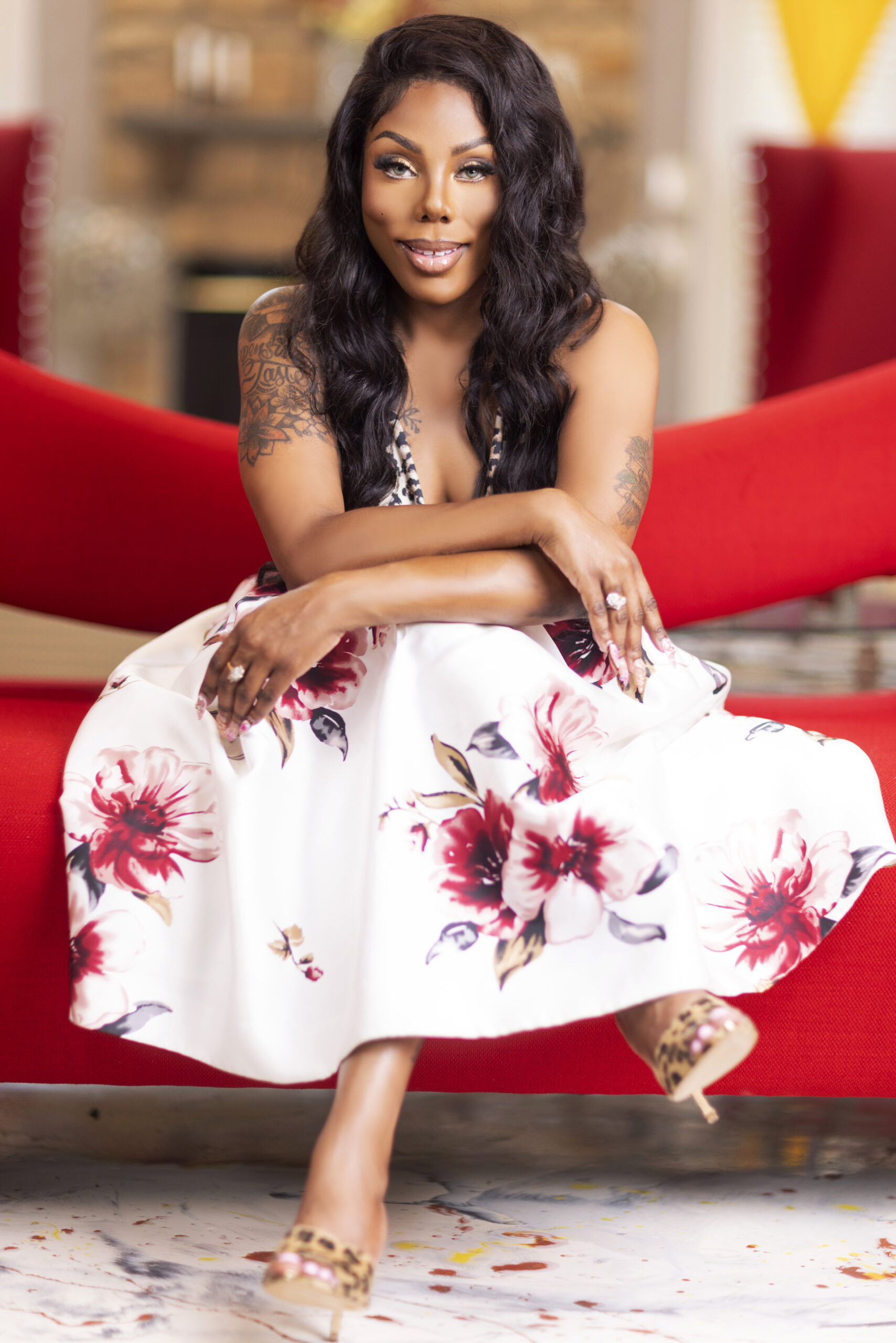( ENSPIRE Health and Wellness ) Hazelwood Creates Practice Progress With Sarah Ashkin Addressing BIPOC & Racism Workshops
Kai Hazelwood is a dancer who became an advocate through her own experience of resilience. A Black, queer woman with an invisible disability, she has committed to heal not only herself but help others. Before the COVID-19 pandemic, Hazelwood began to recover from traumatic memories, which resulted in many health challenges. From stomach infection to genetic connective tissue disorder, Hazelwood discovered she developed PTSD. Although not a definitive diagnosis, she continues to fight for recognition and understanding for herself and those in similar circumstances. Hazelwood is changing the perception of what it means to live with a disability. Hazelwood launched Good Trouble Makers, a healing space where she creates practices that treat the body and mind.
Hazelwood launched a practice for Eye Movement Desensitization and Reprocessing ( EMDR) therapy specifically aimed at Black, queer, and disabled individuals. She recently introduced a practice called Shedding, which is a virtual experience created by their friends at Garden. Part of the experience is that you can dance with snakes, play with reptiles, read, watch, and listen to a collection of experiences created by Hazelwood on GatherTown. Shedding is an embodied healing practice with body-based movement strategies, a QTBIPOC gathering.
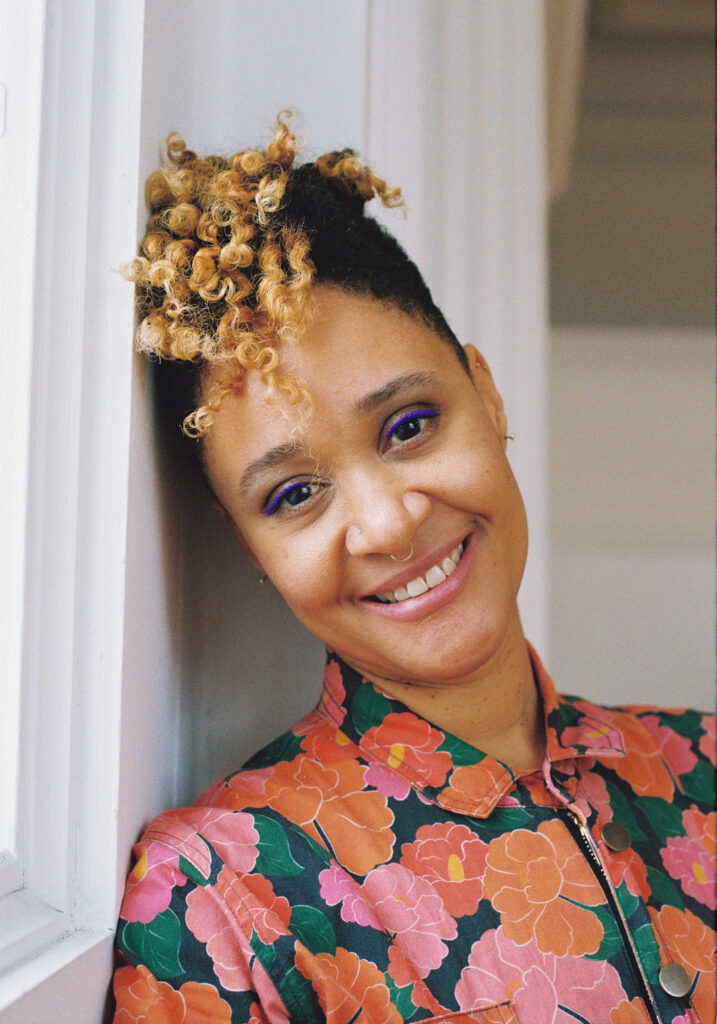
In addition, Hazelwood is also the creator of Practice Progress, working with Sarah Ashkin on their workshops that facilitate anti-racism, learning to address and undo white supremacy. Leading clients toward a sustained cultural shift in their communities, within themselves, and institutions. There are 3 components of their workshops which are based on the needs of the individuals and groups who participate:
- BIPOC Affinity Groups: A safe space for BIPOC to develop personal and community through healing and pleasure.
- White Working Groups: A group where white people increase their personal and relational anti-racist analysis without the hazard to BIPOC that accompanies white people learning in multi-racial settings.
- Multi-Racial Coalitions Building: Laying the foundation for trust and accountability to create new patterns for change. Through sustained relationships, they undo white supremacy through thoughtful follow-up communication and suggestions for continued learning. To deepen the results of the work in these groups by re-engaging with important conversations.
Hazelwood shares her journey as a dancer, having PTSD and facing an illness head-on. In her own words, she explains what Good Trouble Makers are and the practices they offer healing and creativity. In addition, you will learn Hazelwood’s EMDR therapy, the embodied healing of “Shedding.” She will discuss Practice Progress workshops, BIPOC spaces, and more.
From being a dancer to experiencing chronic illness and PTSD. Can you talk about your resilience journey and how you found the strength to heal yourself and advocate for others?
Mine isn’t a resilience journey, and advocating for others is how I continue to heal myself because I can’t do it alone, none of us can, we need each other. I say my life isn’t a resilience journey because my Disability and PTSD aren’t things that can be overcome. They’re just part of who I am every day. My goal isn’t to overcome them but to see myself as whole, lovable, and worthy in a world that tells me I’m not.
In your own words, how would you describe Good Trouble Makers? What well-known practices do you offer that beginners who set foot in this space should explore?
Good Trouble Makers, my collaborative embodied arts and healing justice project is an invitation to participate in spinning a web of community and creative mischief through collaboration across the world to get in good trouble together. Inspired by the words of John Lewis, Good Trouble Makers’ projects are committed to making; making art, making room, making change, and making good trouble. That’s a fancy way to say: My priority will always be to serve the communities I call home, queer folks, Disabled baddies, and Black people, who also are often left out of mainstream wellness spaces and artistry.
So, I utilize my lifetime of experience as a dancer and embodied artist to create artistic projects ranging from performances to writing to community workshops, festivals, and more to foster community building and healing through creativity, play, and joy. Projects may be initiated by myself, but they are always created in response to a need I see or that has been expressed by the communities I come from. Check out Good Trouble Makers’ projects if you want to get down and get free!
Your EMDR therapy practice specifically targets Black, queer, and disabled individuals. Why is this targeted approach critical, and how does it differ from traditional EMDR therapy?
I am a lifelong body-based artist and experienced healing arts facilitator, a survivor of childhood trauma, racism, and sexual violence. I am a Disabled queer and Black cis woman. When I reached a point in my life where the structural and personal violence I have lived through took a toll I couldn’t ignore anymore, I started looking for support and quickly recognized that able-bodied, straight white women, who make up so much of wellness spaces, could not meet me where I needed.
So, I began my own embodied healing work to build the resources I needed, and maybe you do, too. My work differs from traditional EMDR because I see myself as your Healing Hombre. I’m not the expert; in fact, you are the expert in your own healing. I’m here to accompany individuals and groups who are navigating trauma recovery, who want to strengthen their connection to their sense of being at home, and who want to cultivate safety in their own bodies.
You use “Shedding” as a form of embodied healing. Can you elaborate on this concept and how incorporating play can be a powerful tool for healing from trauma?
Shedding is an emergent embodied healing practice based on the understanding that politics is personal and impacts us deeply, including our physical health. So, to change large-scale systemic problems, we need to heal the individual’s body and support them with a healing community.
I call it “playtime” to remind us to lower the stakes and play rather than try to control. I began this project to support my intense moment of shedding and to remind myself that the next time I have to shed, I already know how. I’ve always known how, and so do you.
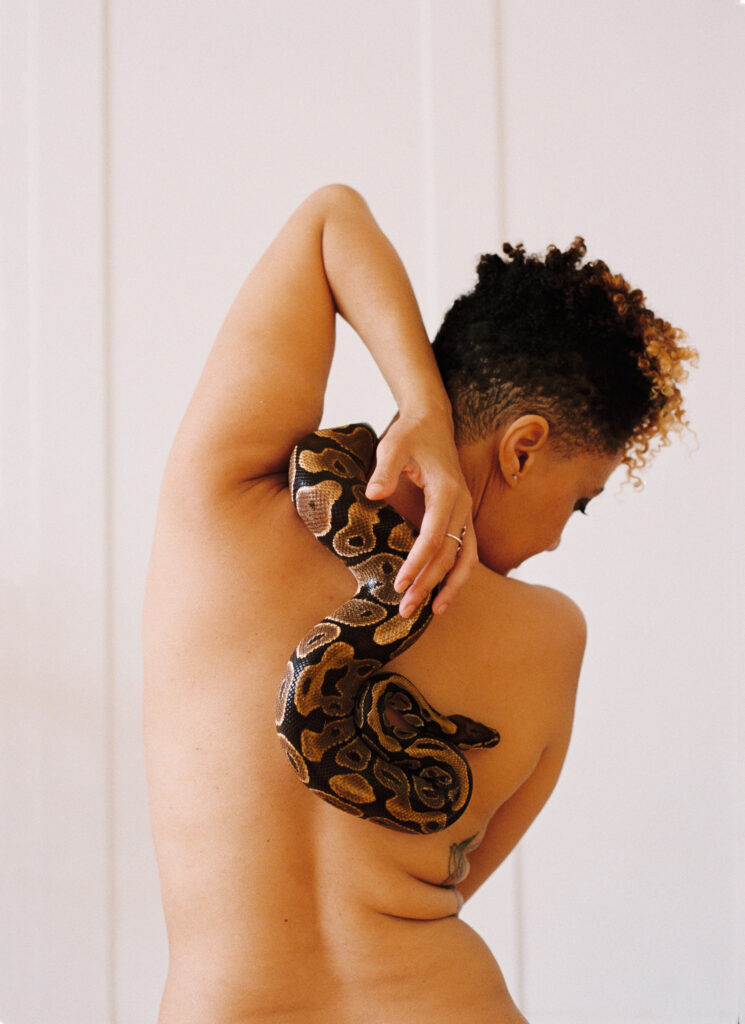
Your work goes beyond individual healing and focuses on large-scale justice. How does healing the individual contribute to dismantling systemic problems?
By focusing on the body, my body, my ancestral body, my cultural body, I am prioritizing the wisdom we each carry within us, tuning my ability to listen to it, and trusting its ability to teach me how to navigate the structures I have to survive every day as a Black, queer, and Disabled woman. I invite you to discover your own brilliance as I uncover mine because enlivened, embodied beings have the power to change the world.
Your Practice Progress workshops create safe spaces for BIPOC and white communities to heal and learn from each other. Why is building community such a crucial aspect of your work? What would be the crucial piece of each workshop that helps people connect on social issues to address racism and white supremacy while healing their inner selves and bodies?
The truth is none of us can heal alone; it’s relational work. We need a community to be with, to feel seen by, to validate, and to support us. Practice Progress reflects this reality by doing our work in the community through our Affinity Group work, separated into a White Working Group and a BIPOC Circle.
Practice Progress also works from the understanding that racism is a physiological problem that affects our health and well-being. In the fall of 2020, Rep. Ayanna Pressley introduced the Anti-Racism in Public Health Act. In April 2021, the CDC joined more than 170 local and state leaders and public health entities in declaring racism a public health crisis. These governmental acknowledgments demand that racism be addressed on the level of the body, and so that is what Practice Progress does. We don’t separate anti-racism work from inner healing work, the anti-racist practice is the inner healing work.
For BIPOC, our workshops center on nervous system regulation, leading to proven outcomes in lower blood pressure, decreased anxiety, lower inflammation, and improved overall well-being (Menakem 2017). The white working group workshops draw from research in Wicked Problem Solving, Mindful Conflict Resolution, and Somatic-Motor Amnesia to train white bodies and minds to slow down, actively listen, and respond nonviolently.
Will there be new workshops or projects within Good Trouble Makers for 2025 that you are looking forward to?
I am excited about turning my 2.5 years of research into a book about Shedding as an embodied healing practice, which I hope will be published soon. I also hope to offer more series of playgroups in Shedding to QTBIPOC worldwide.
BIPOC will cultivate rest, pleasure, and community. Through guided discussion and movement exercises, participants will have their feelings and experiences witnessed in knowing the community. Drawing on the wisdom of authors like Resmaa Menakem (My Grandmother’s Hands) and adrienne maree brown (Pleasure Activism), participants will be guided through rest experiences, build practices to care for their nervous systems, and set mindful boundaries to assert their value and their needs for healthy multi-racial coalition building. Our critical work in affinity spaces supports our sessions toward multi-racial coalition building, which focuses on relational trust and accountability exercises.
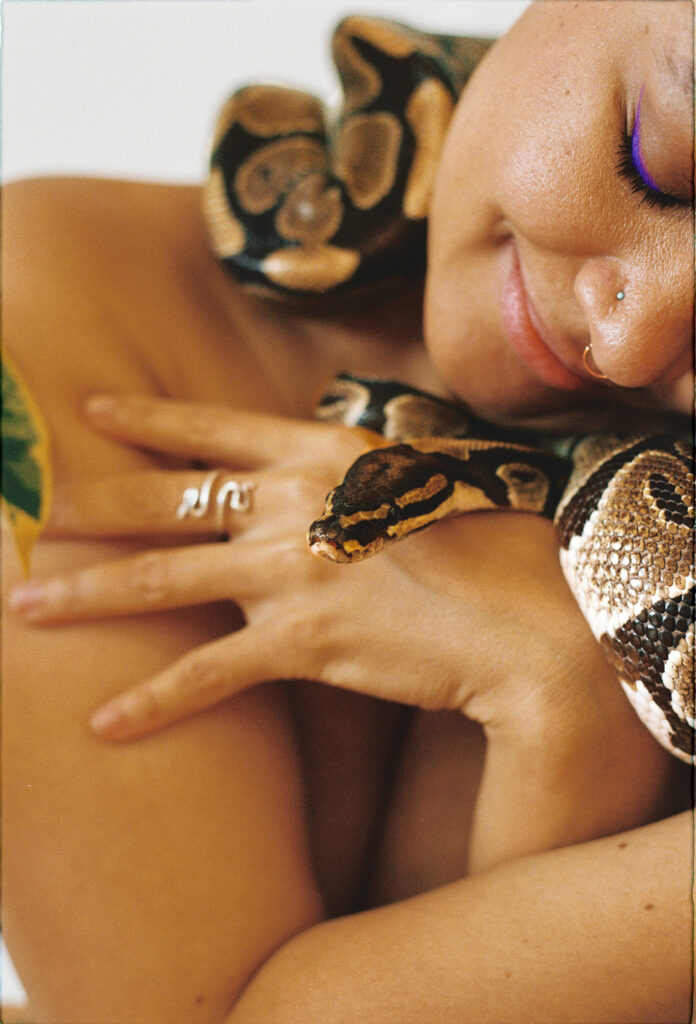
Kai Hazelwood is cultivating healing through workshops that help the body, heal the mind, and create deep thinkers. She is making a safe space for all communities through robust discussions, reflection, and simple movement practices. Follow Good Trouble Makers on Instagram or visit https://goodtroublemakers.com/home. If you are interested in Practice Progress, visit https://www.practiceprogress.org/ to discover their latest workshops.
Related Articles: California Coalition for Black Birth Justice Advocates for Maternal Health, Dawna Campbell ‘The Mind Whisperer’ CEO & Founder of The Healing Heart Inc. Offering Healthy Mindset To Increase Revenue

